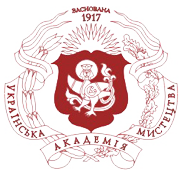ATTRIBUTION OF THE «TWO SAINTS» ICON FROM NATIONAL ACADEMIA OF FINE ARTS AND ARCHITECTURE FUNDS
DOI:
https://doi.org/10.32782/naoma-bulletin-2024-1-11Keywords:
attribution, icon, St. Cyril and Methodius, restoration, iconog raphyAbstract
The purpose of this article is the research and attribution of the icon «Two Saints» from the funds of the Department of Technique and Restoration of works of art of the National Academy of Fine Arts and Architecture. Research methods. The research is based on the methods of artistic, stylistic and comparative analysis of works of art. The attribution of the icon was carried out on the basis of iconographic, stylistic, microchemical and historiographic research. The results. The research made it possible to establish the origin, materials of execution, iconographic type and approximate time of creation of the icon, as well as to analyze the compositional and stylistic features of the work. Based on the analysis of the scientific works of V. Drotenko, I. Kovalchuk, D. Stepovyk and foreign researchers – R. Russeva, A. Philip, Ya. and Ya. Osolsobie, A. Kzhizhova, S. Barlieva, V. Topencharova, I. Bozhilova, N. Tuleshkova, L. Prashkova it was possible to determine the depicted are Saints Cyril and Methodius – the creators of the Glagolitic script and the inspirers of the Christian faith in Europe. This iconographic plot has been spreading in Ukraine since the 18th century, and is reproduced in churches or by folk craftsmen based on the icons and sculptures created in Europe, in particular in Bulgaria, the Czech Republic, etc. Conclusions. As a result of the research, it was attributed to the icon "Two Saints" and to claim that the most likely icon was painted by an unknown author of Ukrainian or Czech origin in the middle or, at the latest, at the end of the 19th century, as a free copy from the sculpture "Saints Cyril and Methodius" by Emanuel Max, which is in Church of the Mother of God in front of Tyn or from its pictorial copy. The icon has artistic, religious and historical value, because it is proof of the connection between European (Bulgarian, Czech) and Ukrainian culture and art. The attribution of such works gives scholars the opportunity to gain a deeper understanding of the course of Ukrainian art history in the context of the development of icon painting in world art.
References
Дротенко В. Семіотика іконопису та стилістика ікони в контексті культурно-мистецької традиції // Молодий вчений, 3 (91), 2021, с.135–140. https://doi.org/10.32839/2304-5809/2021-3-91-30
Ковальчук І. Українська іконографія впродовж XIV–XVІІI століть // Українське релігієзнавство, 2015, с. 100–108.
Степовик Д. В. Українсько-болгарські мистецькі зв’язки. – К.: Наукова думка, 1975.
Rousseva R. Cyril and Methodius in Historical Iconography // Celebrating the legacy of Cyril and Methodius with special reference to historical iconography. Malta: Office of the President of Malta, 2017, s. 61–89.
Filip, Aleš, Osolsobě, Jana, Osolsobě, Jan. Kult sv. Cyrila a Metoděje ve výtvarném umění (klíč k jejich ikonografii). Aleš Filip, Jana Osolsobě, Jan Osolsobě. In: Národopisná revue Strážnice: Národní ústav lidové kultury Roč. 23, č. 2 (2013), s. 120–133.
Křížová Alena. Cyril a Metoděj na svatých obrázcích // Národopisná revue Strážnice: Národní ústav lidové kultury Roč. 23, č. 2 (2013), s. 134–137.
Delikari Angeliki. The Literary Work of the Cyrillo-Methodian Mission in Great Moravia and its Transmission Around Ohrid During the 9 th and 10 th centuries // Cyrillomethodianum XX, 2015, c. 7–14.
Barlieva Slavia. The Cult of Saints Cyril and Methodius: The Phenomenon of Shared Identity in the Slavic World. Edited by Madeleine Gray (King's College London Medieval Studies), 2017.
Топенчаров В. Константин-Кирилл Философ – АБВ Ренессанса. София Пресс, 1985.
Божилов И., Тулешков Н., Прашков Л. Български манастири. София, 2004. С. 205–218.
Hetényi, Martin, Peter Ivaniˇc. The Contribution of Ss. Cyril and Methodius to Culture and Religion // Religions. 12: 417. https://doi.org/10.3390/rel12060417








